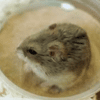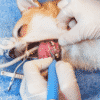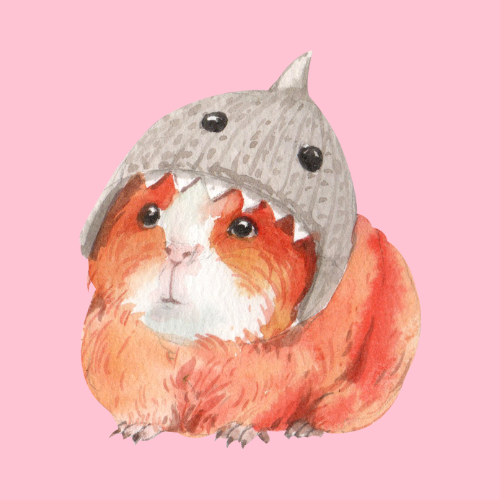Recently I’ve come across a couple of forum posts about this subject. I’m going to do my best to explain it in more detail. The unsettling truth is that rabbits can and do regularly die of fright. The most worrying part is it’s not uncommon. The medical term for this is “Capture Myopathy” or sometimes Exertional Myopathy. Rabbits are not the bravest of animals and can become scared quite easily. When rabbits become intensely scared their body reacts to this fear in many different ways. Some of these natural reactions given the situation can be overpowering to their sensitive bodies and sometimes even fatal.

It’s important to note that rabbits may not instantly die from fear or fright. However, the impact of an intense situation can cause health problems which can lead to eventual death weeks or months later.
Rabbits have a resting heart rate that sits between 140 to 180 beats a minute which is pretty insane when you think about it. Now imagine a rabbit that is under constant stress or fear for its life, what do you think that heart rate would be?
There are many occasions that happen frequently which cause enough stress to rabbits in order for them to die. The most common among them are fireworks, thunderstorms, and the threat of a predator. It’s important for us as owners of rabbits to ensure they are not exposed to these situations. Especially if your rabbit is in a hutch and doesn’t have the ability to move naturally.
Why Do Rabbits Die of Fright?
When a rabbit perceives a threat or a frighting situation the rabbit’s brain will release a variety of chemicals most notably “neurotransmitters”. These chemicals send signals to many different parts of the rabbit’s body, mainly tissues, and glands.

Now some of these glands the “adrenal glands” release adrenaline (epinephrine). Adrenaline causes the rabbit’s heart rate to drastically increase alongside an incredible increase in blood pressure. This is a survival mechanism the blood flow is diverted to the essential parts of the rabbit’s body which are used to escape. Which are often not used since they are enclosed.
If you consider that most rabbits don’t have the ability to freely move around large areas and usually sit in relatively small enclosures, then combine that with a body full of adrenaline and a weak, sensitive heart, which is already beating at a ridiculous rate you can start to see the problem.
Essentially rabbits die of fright because their bodies produce a large amount of adrenaline which overwhelms the heart.
There are mainly common medical issues associated with emotional stress in rabbits such as;
- Heart failure.
If you would like to read a more scientific and clear-cut explanation of how all of this works on a more technical level I recommend reading the following:
Sudden death: mechanisms of resistance under acute emotional stress in rats and rabbits
It’s an academic paper produced by the Russian academy of medical sciences.
How Long Does It Take for a Rabbit to Die of Fright?
The effects of this can be peracute (immediately), acutely (within minutes), or chronically (in hours, days, or weeks). Depending on the severity of the shock in combination with the pre-existing health of the rabbit.
How to Prevent Rabbits From Dying of Fright?
It’s an upsetting topic and I’m sorry if you’ve had to experience this yourself with your own rabbits. The truth is rabbits are fragile animals with sensitive hearts. We can only do so much in the way of protecting them. The best we can do is use our common sense, and try to prevent our pets from being exposed to terrifying situations.

This isn’t always practical.
Fireworks are one of the most common problems. If you know there is an annual occasion in which fireworks are common then you can try to pre-empt this problem.
We have to predict any future events and encounters that we will cause stress to our precious friends. Let’s all do our best to prevent fear in their lives and that’s about all we can do.
Check out our other rabbit articles:
- Do Rabbits Know Their Names?
- Do Rabbits Like Music? (Including Case Study)
- Do Rabbits Like Blankets? Ultimate Guide!
- Do Rabbits Like Rain? : Fun Facts About Rabbit Behavior in the Rain
What Are Some of the Things That Scare Rabbits?
Many things can frighten your rabbit. Here are the top common fears of rabbits, in no particular order:
Fear of Predators
This is the number one fear for rabbits as they are constantly aware of their surroundings and know that many animals are out there that could potentially harm them. Predators can include anything from other animals such as foxes, coyotes, and hawks to humans. You can help your rabbit feel safe from predators by keeping them inside and providing them with a secure enclosure.
Loud Noises
This is one of the top fears of rabbits. Loud noises can startle and frighten rabbits. This fear is closely related to the fear of predators, as loud noises can often be associated with danger. Sudden noises or loud sounds can startle a rabbit and cause them to become fearful or even panic. They can be scared by loud noises such as thunder, fireworks, or even cars driving by.
Make sure to keep your rabbit away from any areas where there may be a lot of noise. You can also try to provide them with a safe place to hide, such as a cardboard box.
Strangers & New Animals
Another fear that rabbits commonly experience is being around new people or animals. When a rabbit has never met someone or an animal before, it will often become scared and may even try to run away. This is especially true for young rabbits who are still trying to learn about the world around them. Many rabbits are scared of strangers, especially if they have never seen that person before.
Make sure to introduce any new people to your rabbit slowly and calmly, so they can get used to them.
Dogs
Many rabbits are scared of dogs and for a good reason. Many dogs will chase and bark at rabbits, which can cause them to become very frightened. If you have a dog, keep them away from your rabbit’s area.
New Environment
When a rabbit is moved to a new environment, they can often become scared and confused. It’s incredibly stressful if they’re relocated to a location they’re not accustomed to.
Rabbits may take some time to adjust to their new surroundings, so be patient with them. Try to keep their environment as similar as possible to the one they were used to.
Being Touched & Being Held
Many rabbits are very skittish and will often jump at the slightest touch. Many rabbits will become agitated and may even try to bite or scratch when held.
Rabbits do not want to be restrained, so being held is one top fear of many rabbits. This is often because they are prey animals, and being held makes them feel vulnerable.
If you need to pick your rabbit up, do it slowly and calmly, and never force them to do anything they don’t want to do.
Being Left Alone
Rabbits are social animals and enjoy being around others. When left alone, they can become scared or lonely, leading to them developing other fears.
If you need to leave your rabbit alone for an extended period, provide them with plenty of toys and food. You can also try leaving a radio on so they will have some noise to listen to.
Sudden Movements
Rabbits can be scared by sudden movements, such as someone jumping up or a cat running around.
Make sure to always move calmly around your rabbit and never scare them.
These are the top common fears of rabbits, but many other things can also scare them. If you are ever unsure about what scares your rabbit, always ask a veterinarian or animal behaviorist for help. By understanding these fears, we can help to make our rabbits feel more comfortable and less fearful.
Ways to Help Calm Your Fearful Rabbit
One of the best ways to help reduce your rabbit’s fear is by providing them with a safe and comfortable environment. This means having a designated space for them to hide in and plenty of toys and items to chew on.
You can also try to socialize your rabbit with other animals and people, which will help them feel more comfortable around strangers. It is also essential for rabbits to see people so they don’t become scared when they are suddenly approached.
If your rabbit is afraid of being touched, try to start slowly by petting them calmly and soothingly. Never force them to do anything they don’t want to do.
Lastly, always make sure to respect your rabbit’s space and never scare them.
By knowing what scares rabbits, you can help to keep them safe and avoid any potential problems. Keep these tips in mind, and always be aware of your rabbit’s fears!
What Will My Rabbit Look Like if They Are Scared?
There are several things you might see if your rabbit is scared. They may tuck their head and body down low to the ground, make themselves small, and freeze in place. Your rabbit may also try to make a quick getaway by running away quickly. If your rabbit is genuinely terrified, it may even urinate or defecate itself.
One way to tell if your rabbit is scared is by looking at its ears. When a rabbit is frightened, its ears will go back against its head. If you see this, it’s a good indication that your rabbit feels scared.
Conclusion
Rabbits are prey animals, and as such, they are naturally afraid of things that could potentially harm them. While some fears may be more common than others, it is essential to remember that each rabbit is different and will react differently to various stimuli. By being aware of your rabbit’s fears and taking the necessary precautions, you can help to ensure that they live a safe and happy life.

Doctor of Veterinary Medicine (D.V.M.) at Nation Taiwan University,Master of Science (M.S.) in Biomedical Engineering at National Taiwan University of Science and Technology




